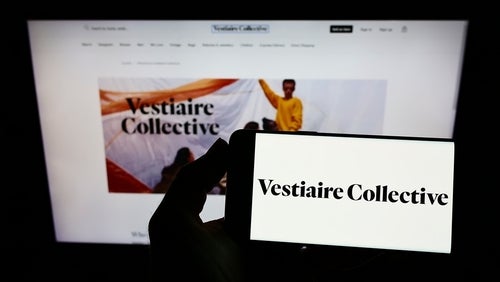
The fashion resale platform’s report, which is based on both consumer behaviour and environmental impact calculations aims to uncover the environmental and social impact that resale models have on the wider apparel industry.
Vestiaire Collective, which already has B Corp status for its environmental and social credentials, is also keen to become the first in its sector to publish a comprehensive environmental and socioeconomic profit and loss statement in a bid to highlight the positive changes that are possible within the fashion industry.
Fanny Moizant, Vestiaire Collective co-founder and president explained: ‘We hope that the work we are doing in this area will inspire businesses and consumers to change and embrace the ‘fewer but better’ model, helping to further reduce the fashion industry’s environmental impact.’
The consumer behaviour survey taken by over 2,000 of its shoppers in 57 countries in December 2021 revealed the amount of consumers using the resale platform instead of buying first-hand purchases was 23.5% higher than previous studies.
The report also found that 85% of pre-owned buyers help to reduce overconsumption by trading up to fewer items that are described as ‘better quality’.
Vestiaire Collective believes that second-hand has lost its stigma and it’s rapidly becoming popular. The report says: “It’s cooler, cheaper and more sustainable, as long as it directly replaces a first-hand purchase.”
The company also suggests that resale is expected to grow 11 times faster by 2025 than clothing as as whole and 33 million consumers bought second-hand clothing for the first time in 2020.
The report boasts that half of its sellers wouldn’t have resold their items without the platform so it believes the platform’s existence is giving unworn items a second life.
Vestiaire Collective collaborated with audit company Pricewaterhouse Cooper to calculate the environmental impact valuation within the report. The report explains that purchasing second-hand fashion on the resale platform can save as much as 90% of the environmental impact of a new fashion item.
The resale platform also claims that 17kg of CO2 is saved when an item is bought second-hand and it states that resale is expected to double its market share between 9% to 18% between 2020 and 2030.
The report says: “If this stopped the production of the equivalent amount of new items b 2030, this would save the planet EUR38bn (US$41.37bn).
Vestiaire Collective is said to be the first platform in the resale industry to use a monetisation technique to demonstrate the positive impact that resale can have on the fashion industry.
The calculated cost to the environment per second-hand purchase on Vestiaire Collective is said to be EUR0.39, which is just one-tenth of the environmental cost of a new purchase (EUR3.90).
The report highlights that logistics plays a part in both first and second-hand sales, so the company has committed to reaching a net climate benefit by 2025 that will not rely on offsetting.
Dounia Wone, Vestiaire Collective chief sustainability and inclusion officer said: “Vestiaire Collective’s business model is truly unique. Our role in the Sustainability & Inclusion team is to provide the right data to support this claim, and to keep challenging ourselves to make improvements – and in turn, keep challenging the industry to transition faster. We are wary of the fact that resale still has the potential to contribute to a culture of overconsumption. Therefore it’s important to us to work with our community to encourage a move away from fast fashion, to ensure we can have the biggest possible impact.”



